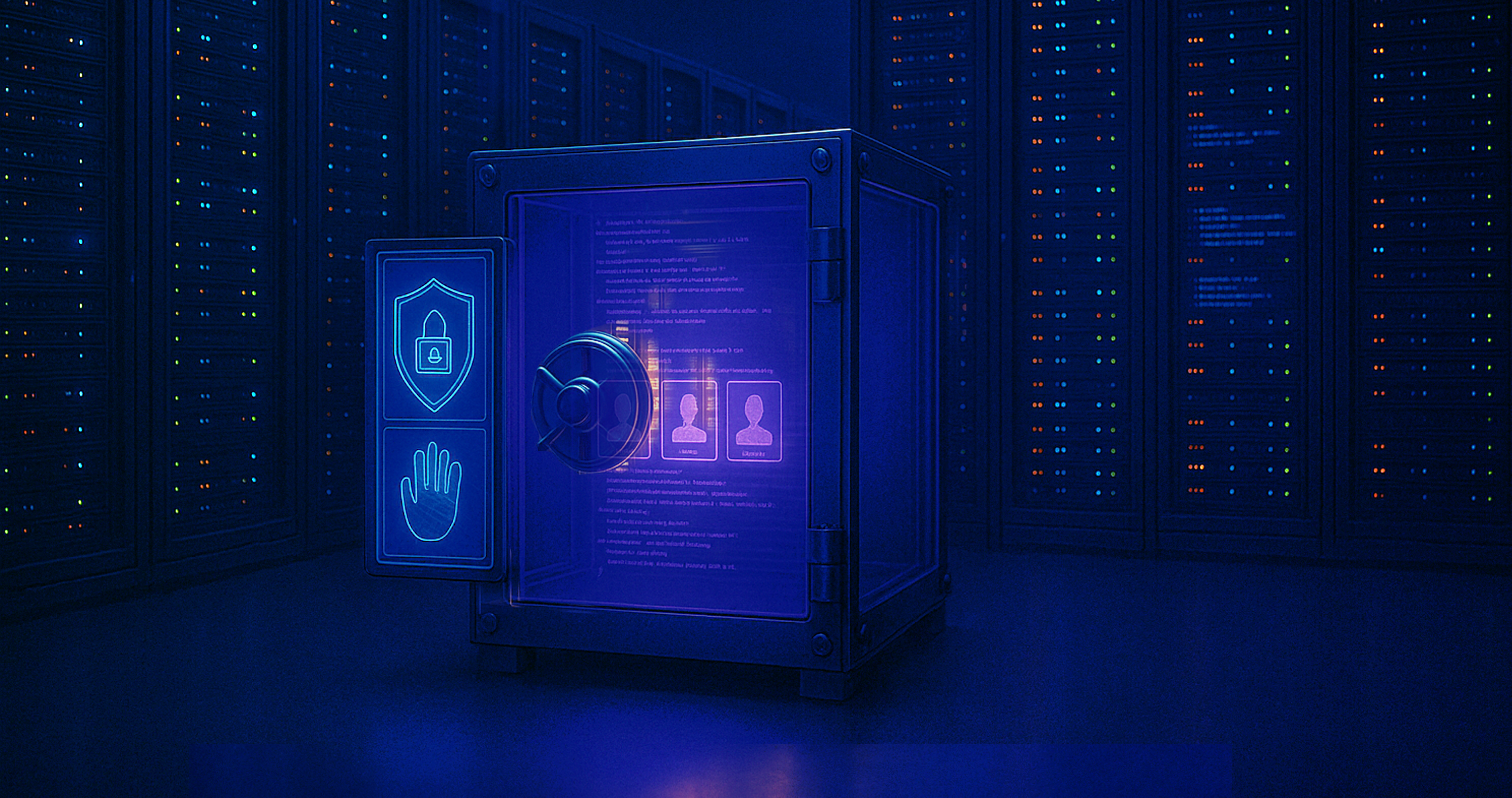Table of contents
In our latest article, we explore the top benefits of implementing AI cloud security for enterprises. AI workloads demand more than traditional cloud security, requiring protection for sensitive datasets, models, and pipelines. NexGen Cloud’s private secure cloud provides single-tenant isolation, EU/UK data residency, enterprise-grade GPU clusters, low-latency interconnects, and full auditability, enabling businesses to innovate with AI confidently while maintaining compliance and protecting their most valuable AI assets.
AI adoption is moving at lightning speed. From large enterprises to small startups, everyone is looking to leverage AI for innovation and automation. But here’s the catch: the more your AI stack grows, the more the risks.
And that’s exactly why your AI Stack needs to have AI cloud security. Unlike traditional cloud security for general workloads, AI cloud security is built to protect data-intensive and modern GPU-heavy environments. It keeps your sensitive training data, intellectual property and AI pipelines safe from breaches, misuse and hidden threats.
If you’re wondering why this matters, think of it this way: you wouldn’t protect an AI lab training billion-parameter models with the same measures you’d use for a simple SaaS tool. Likewise, your enterprise AI stack needs security built for AI, not generic cloud apps.
In our latest article, we talk about the key benefits of implementing AI cloud security and why enterprises should build their workloads on a private secure cloud.
1. Protecting Data Integrity and Confidentiality
Your AI models are only as good as the data they’re trained on. If that data is compromised, manipulated or stolen, your AI outcomes can be incorrect. Worse if in the wrong hands, your intellectual property can boost your competitors’ models.
This is because:
- AI training often requires sensitive data: customer information, healthcare records, financial transactions or proprietary datasets.
- Even anonymised datasets can sometimes be reverse-engineered, exposing hidden patterns or identities.
- Side-channel attacks in shared cloud environments can leak metadata that helps adversaries map out your AI pipelines.
With AI cloud security, data integrity and confidentiality are maintained throughout the lifecycle of your AI workloads, from ingestion to training, fine-tuning and inference. Security controls such as encryption at rest and in transit, workload isolation and zero-trust access policies ensure that your datasets and models remain genuine and confidential.
2. Ensuring Regulatory Compliance
Enterprises today face a web of regulations: GDPR in Europe, HIPAA for healthcare, PCI-DSS for finance and now the EU AI Act, which introduces even stricter requirements for AI deployment.
These regulations ensure your AI stack offers:
- Data residency and sovereignty: AI workloads can be confined to compliant regions (e.g., EU/UK) to ensure cross-border transfer restrictions are met.
- Auditability: Every model deployment generates a trail of who accessed the data, when and for what purpose.
- Transparency: AI cloud security eliminates “hidden subprocessors” so enterprises know exactly who has access to their pipelines.
Without these, you can risk multi-million-dollar fines, reputation damage and operational disruptions.
3. Preventing Model Theft and Poisoning
AI models are now valuable assets. A trained LLM or a computer vision model can represent millions of dollars in development costs. But without proper AI cloud security, they’re vulnerable to:
- Model theft where attackers extract model weights or APIs and resell them.
- Model inversion where malicious actors reconstruct original training data by querying deployed models.
- Data poisoning where bad actors insert malicious or misleading data into training pipelines, corrupting outputs.
With isolated environments, strict identity management and private access controls, AI cloud security reduces the risk of such attacks. For enterprises, this means protecting both the economic value and the trustworthiness of your AI stack.
Just think a financial institution is deploying an AI fraud detection model. If poisoned training data is introduced, the model could misclassify fraudulent transactions as legitimate. The cost? Millions lost to GDPR (Article 32) fines for failing to ensure data integrity and security in AI systems.
4. Securing AI Pipelines End-to-End
Unlike traditional software stacks, AI pipelines are dynamic and iterative. You don’t just deploy once, you have to ingest new data, fine-tune models, retrain and optimise inference. Each of these touchpoints can lead to a potential attack surface.
However, AI cloud security can ensure you get:
- End-to-end encryption of data flows.
- Secure orchestration of model training jobs across GPU clusters.
- Controlled, auditable deployment pipelines for inference.
- Protection against shadow IT (unauthorised pipelines running outside corporate oversight).
When you secure the pipeline end-to-end, you can maintain trust across every stage of AI development and deployment.
5. Building Scalable and Future-Proof AI Deployments
AI cloud security is not just about risk prevention, it is about how you enable growth. Secure environments allow enterprises to confidently scale workloads without worrying about hidden vulnerabilities. Here’s how:
- Dedicated GPU clusters that can handle massive training jobs without noisy neighbours.
- Low-latency interconnects for real-time inference on large models.
- The ability to reserve future-proof GPUs (such as NVIDIA Blackwell) in secure environments.
- Assurance that as regulations evolve, your AI stack remains compliant by design.
Why You Need a Private Secure Cloud for AI
Let’s address the big question first: how do you actually implement it in your enterprise AI stack? The answer lies in understanding your workload. While not every multi-tenant public cloud environment is inherently risky, industries handling highly sensitive workloads such as finance, healthcare, defence or enterprises dealing with proprietary R&D cannot afford the potential exposure.
If your AI stack is deploying any of these, moving to a private secure cloud deployment is the ideal option. NexGen Cloud offers a private, secure cloud where you can deploy critical AI workloads with full confidence. Here’s how:
- Single-tenant deployments for full isolation.
- EU/UK hosting to ensure GDPR and sovereignty compliance.
- Private access control and audit trails for accountability.
- No hidden subprocessors for full transparency.
- Enterprise-grade GPU clusters for AI with NVIDIA HGX H100, NVIDIA HGX H200 and future-proof NVIDIA Blackwell GB200 NVL72 GPUs.
- Low latency and high throughput with InfiniBand and NVMe storage.
Final Thoughts
AI is a mission-critical strategy for businesses now. But as AI adoption accelerates, so does the risk. Generic cloud security is no longer enough. Enterprises need AI cloud security to protect data, models and pipelines while being compliant and scalable.
And the best way to unlock them? Build your AI stack on a private, secure cloud.
FAQs
What is AI cloud security?
AI cloud security protects data, models, and pipelines in GPU-heavy AI environments using encryption, isolation, and compliance controls.
Why is traditional cloud security not enough for AI?
Traditional cloud security protects generic apps but AI workloads need safeguards for sensitive datasets, model theft, poisoning and regulatory compliance.
Which industries need a private secure cloud for AI?
Finance, healthcare, defence, and enterprises handling sensitive or proprietary data require private secure clouds for compliance and maximum protection.
Can AI cloud security help with regulatory compliance?
Yes, it ensures GDPR, HIPAA, PCI-DSS and EU AI Act compliance by enforcing data residency, auditability, and transparent access controls.
What risks arise without AI cloud security?
Enterprises face data breaches, poisoned models, regulatory fines, IP theft, and reputational damage without proper AI-specific security measures.
How does a private secure cloud support scalability?
It provides dedicated GPU clusters, low-latency interconnects, and compliance-ready infrastructure for growing AI workloads without compromising security.

